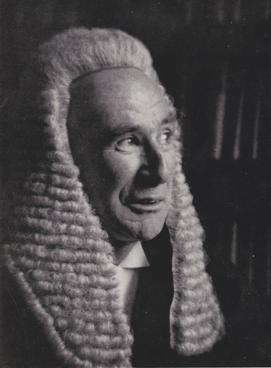Gordon Stott, Lord Stott facts for kids
Quick facts for kids
Lord Stott
|
|
|---|---|
 |
|
| Lord Advocate | |
| In office 1964–1967 |
|
| Preceded by | Ian Hamilton Shearer |
| Succeeded by | Henry Stephen Wilson |
| Personal details | |
| Born | 22 December 1909 |
| Died | 12 April 1999 (aged 89) |
| Nationality | Scottish |
| Spouse | Nancy Braggins |
| Occupation | Advocate, sheriff, Lord Advocate, senior judge |
| Known for | Diaries |
George Gordon Stott, Lord Stott (born 22 December 1909 – died 12 April 1999) was an important Scottish lawyer and judge. He held the role of Lord Advocate, which is the main legal officer for the government in Scotland. After he retired, Lord Stott published three books based on the diaries he kept during his long career. These books were full of interesting stories and observations.
Contents
Early Life and Education
Gordon Stott was born in 1909. He was the youngest son of Reverend Dr. George Stott, who was a minister in Edinburgh, Scotland. Gordon went to the local village school first. Later, he attended Edinburgh Academy and then Edinburgh University. At the university, he studied Classics and Law, graduating with top honors. He even won a special scholarship for his legal studies.
Beliefs and Politics
Gordon Stott was a pacifist, meaning he believed in peace and was against war. During World War II, he chose not to join the military. Instead, he worked on farms as a way to help his country. He also helped other people who shared his beliefs by giving them free legal advice. From 1939 to 1944, he edited a newspaper called the Edinburgh Clarion, which was linked to the Labour Party.
He tried to become a Member of Parliament several times but was not elected. He was also a founding member of a group for Labour lawyers and worked as a secretary for the Edinburgh and District Trades Council.
Family and Hobbies
In 1947, Gordon Stott married Nancy Braggins. They had two children, Elizabeth and Richard. In his free time, he enjoyed walking, fishing, reading, and playing golf.
Lord Stott was known for being friendly and kind. He spoke his mind and did not like dishonesty. He was also known for his sense of humor.
His Famous Diaries
After he retired, Lord Stott published three books. These books were filled with funny and sometimes private stories from his diaries. They were called Lord Advocate's Diary (1991), Judge's Diary (1995), and QC's Diary (1998).
Legal Career Highlights
In 1936, Gordon Stott became an Advocate in Scotland. At first, his strong political views were not very popular among other lawyers. After World War II, he worked as an Advocate-Depute, which meant he was a prosecutor. He often worked on cases involving accidents in factories or workplaces.
From 1949 to 1956, he was part of a special group that looked into companies to make sure they were not unfairly controlling markets. He became a senior lawyer, known as a King's Counsel (KC), in 1950. This title changed to Queen's Counsel (QC) in 1952.
A Strong Lawyer
Lord Stott was known for his clear and powerful arguments in court. He was a very tough opponent. He often won cases even when higher courts had made decisions against him. He would appeal these decisions to the House of Lords in London, which was the highest court at the time, and often succeeded. He once said that some decisions from the Scottish courts were "atrocious" and had to be corrected in London.
Between 1961 and 1964, he served as the main judge for a group of areas called Roxburgh, Berwick, and Selkirk. This role is called Sheriff Principal.
Becoming Lord Advocate
When the Labour government, led by Harold Wilson, came to power in 1964, Gordon Stott was appointed as Privy Councillor and Lord Advocate. As Lord Advocate, he was the chief legal officer in Scotland. He had complete independence in his role as a public prosecutor and legal advisor to the government.
During his time as Lord Advocate, he helped make several important changes to the law. He also helped create the Scottish Law Commission, which works to improve and simplify Scottish law.
A Judge's Life
In 1967, a senior judge position became available. Following tradition, Lord Stott appointed himself to this role. He later joked that he turned out to be "a jolly good judge." He became a Senator of the College of Justice, which is like a High Court judge in Scotland. He worked in the appeal court, called the Court of Session.
When dealing with cases about child custody, he would often talk informally with the children involved. He once wrote about a boy who preferred to stay with his father. When Lord Stott asked why, the boy said, "It's the mince. It's not watery." This shows his kind and down-to-earth approach.
Lord Stott retired from his judicial role in 1984, at the age of 75.
 | Claudette Colvin |
 | Myrlie Evers-Williams |
 | Alberta Odell Jones |

